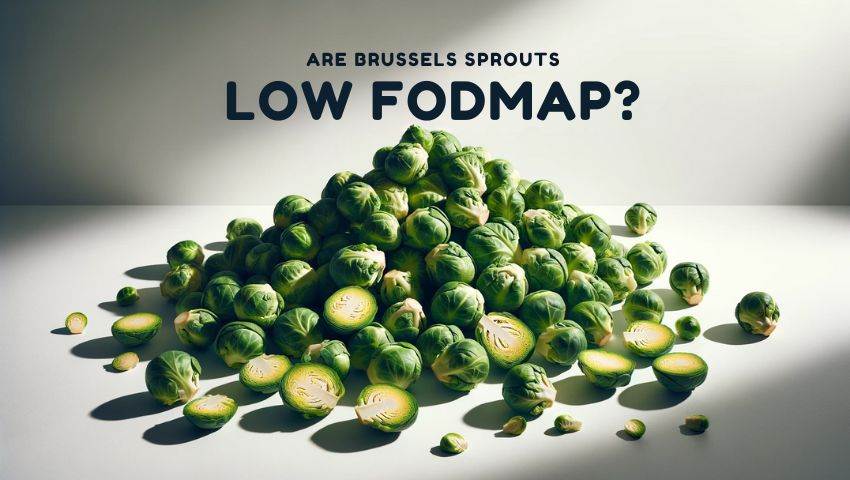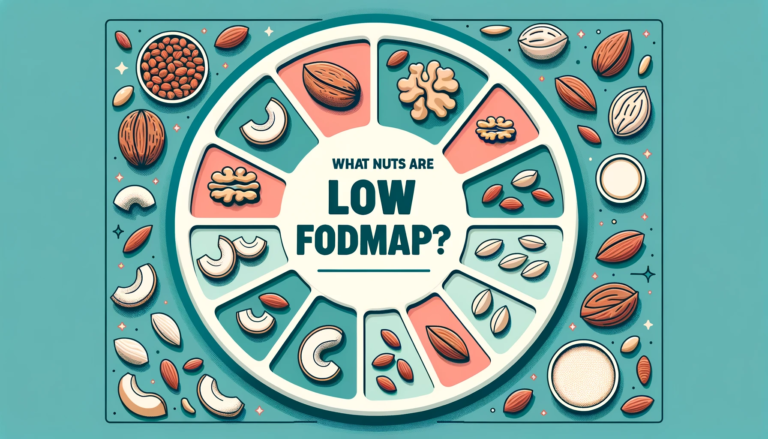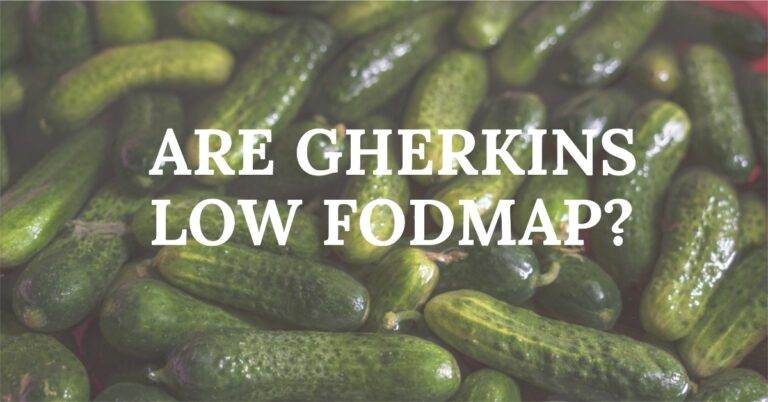Are Brussels Sprouts Low FODMAP? – Explained for IBS Sufferers

Adapting to a low FODMAP diet, especially with a history of celiac disease and IBS, is undeniably a tightrope walk.
The big question for today: Are Brussels sprouts your friend or foe in this dietary landscape?
In short: Brussels sprouts are on the safe list – so long as you don’t exceed around 75g per serving! After that, you’re entering high FODMAP territory, which could lead to IBS flare-ups!
Read on for the inside scoop on integrating Brussels sprouts into your low FODMAP journey.
Key Takeaways
- Brussels sprouts are low FODMAP in small servings (below 75g).
- They contain fructans, a type of FODMAP.
- Large servings of Brussels sprouts can cause discomfort.
- Several recipes cater to a low FODMAP diet with Brussels sprouts.
- A low FODMAP diet restricts certain sugars that cause digestive discomfort.
Understanding the FODMAP in Brussels Sprouts
Brussels sprouts have been a contentious little vegetable for many, not just for their taste but also for their potential effects on the gut.
For those on a low FODMAP diet, being keen on what goes on your plate is essential.
Brussels sprouts contain fructans. You might wonder, “What the heck are fructans?” They’re a type of FODMAP that can be tricky for some with IBS.
Yet, the good news is that these green minis are considered low FODMAP, but in small doses.
So, think of them as occasional guest stars on your plate rather than the main act.
Portion Size Matters
You’ve heard it said about everything from chocolate to wine: moderation is key. The same holds true for Brussels sprouts.
Living with both celiac disease and IBS, I know how even a small misstep can lead to a world of discomfort.
That’s why it’s crucial to keep the serving size to about 2-3 sprouts. Seems a tad strict?
Remember, it’s all about balance.
A small portion allows you to enjoy the goodness of Brussels sprouts without wreaking havoc on your digestive system.
Dealing with Fructans
Fructans, found in Brussels sprouts, belong to a group of sugars or fermentable carbs which are notorious for causing stomach unrest.
But, don’t let the presence of fructans in Brussels sprouts scare you away.
With other ingredients in the mix, Brussels sprouts can still be part of a delectable, IBS-friendly meal.
And for the curious minds, here’s a brief rundown of what these problematic sugars are:
Types of FODMAPs & Their Effects
| FODMAP Type | Common Sources | Effects on IBS Sufferers |
|---|---|---|
| Fructose | Apples, Honey | Bloating, gas |
| Lactose | Milk, Cheese | Diarrhea, cramps |
| Mannitol | Mushrooms | Gas, bloating |
| Sorbitol | Apples, Pears | Gas, bloating |
| GOS (galacto-oligosaccharides) | Lentils, Beans | Gas, bloating |
| Fructans | Wheat, Garlic | Gas, bloating |
If you’re wondering about the rest of these FODMAPs, you can find out more about their effects and sources in these articles:
Recipes to The Rescue
Love Brussels sprouts but unsure of how to incorporate them in a low FODMAP manner? You’re in luck!
There’s a trove of recipes designed to let you savor these sprouts while keeping IBS symptoms at bay.
These recipes usually include small amounts of Brussels sprouts combined with other low FODMAP fruits and ingredients.
So, while you might not be devouring a whole bowl of sprouts, you’ll still get that delicious taste – without the unwanted after-effects.
List of Low FODMAP Ingredients for Your Kitchen:
- Zucchini
- Strawberries
- Carrots
- Chives
Incorporating Brussels sprouts with these ingredients can lead to tasty, gut-friendly dishes.
For more on low FODMAP fruits, check out the details in my article on are nectarines FODMAP friendly?
The Science Behind FODMAPs and Brussels Sprouts
Understanding the reason behind why certain foods are considered high or low FODMAP can provide a sense of control in managing IBS symptoms.
FODMAPs, or Fermentable Oligosaccharides, Disaccharides, Monosaccharides, and Polyols, are specific types of carbohydrates known to cause irritation and discomfort in the digestive system for those with sensitive guts.
You might find it fascinating that Brussels sprouts fall under the category of vegetables containing fructans, a type of FODMAP.
Consuming them in moderate quantities can still be a part of a well-balanced low FODMAP diet as long as you keep your portion sizes in check.
Experimenting with Portion Control
Living with both celiac disease and IBS since 2021 has made me a bit of a scientist in my own kitchen.
Through a process of trial and error, I have learned that portion control can be a game-changer, especially when it comes to foods that contain fructans like Brussels sprouts.
It’s not all about denial and restriction. Believe me, a serving of 2-3 sprouts might seem small, but when combined with other flavorful low-FODMAP ingredients, it can be quite satisfying.
Trying out various recipes that use small amounts of Brussels sprouts has been an exhilarating culinary adventure, finding the perfect balance between enjoyment and comfort.
Sensitivity to FODMAPs: A Personal Observation
- Severity can vary from person to person
- Not all high FODMAP foods will trigger symptoms
- Keeping a food diary can be a helpful tool
- The reintroduction phase is essential for pinpointing individual triggers
In my experience, the severity of symptoms can vary greatly among individuals.
It’s essential to be mindful of the potential effects and to tailor your diet to your own body’s responses.
A useful tool in this process is keeping a detailed food diary to track the effects of different foods on your system.
Incorporating Brussels Sprouts into Your Diet
When we talk about incorporating Brussels sprouts into a low FODMAP diet, creativity comes to the fore.
There are numerous recipes available that make use of a small portion of Brussels sprouts combined with other low FODMAP ingredients.
They allow you to create a meal that is both nutritious and gentle on the stomach.
If you don’t know where to begin, here are a few recipe ideas:
- Brussels Sprouts Salad: Toss a handful of shredded Brussels sprouts with mixed greens, a sprinkle of parmesan, and a zesty lemon vinaigrette.
- Roasted Brussels Sprouts with Garlic-infused Olive Oil: Combine Brussels sprouts with other low FODMAP vegetables, season with herbs, and a splash of garlic-infused olive oil before roasting to perfection.
- Stir-fried Brussels Sprouts with Ginger: Quick stir-fry of Brussels sprouts with a touch of ginger, adding a burst of flavor without irritating the stomach.
I must say, experimenting with different combinations and flavors has not only helped me manage my symptoms but also turned me into quite the innovative cook!
I highly recommend giving it a try.
Final Thoughts – Are Brussels Sprouts Low FODMAP?
Knowledge and personal experience are your best allies when following a low FODMAP diet.
Brussels sprouts, despite containing fructans, can still find a place in your diet with mindful portion control.
Remember, it’s about finding what works for you personally.
With some experimentation and perhaps a sprinkle of culinary creativity, you might find that Brussels sprouts can be a delightful addition to your low FODMAP menu.
Disclaimer: This content is based on my personal experience as an individual diagnosed with celiac disease and IBS (Irritable Bowel Syndrome) who follows a strict gluten-free diet. This does not constitute medical advice. Please consult a medical professional, nutritionist, or qualified dietitian for personalized, professional advice.






